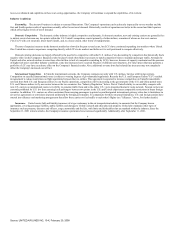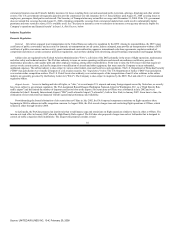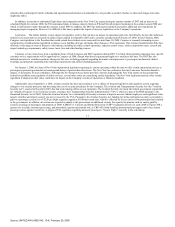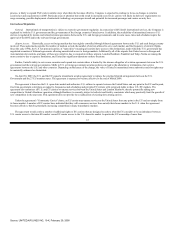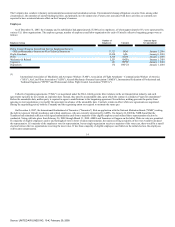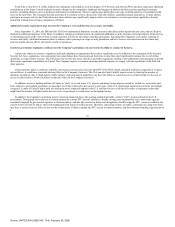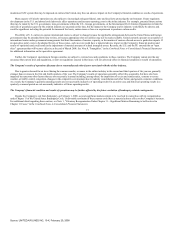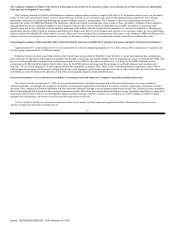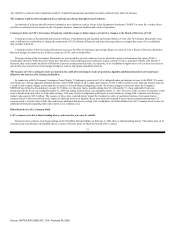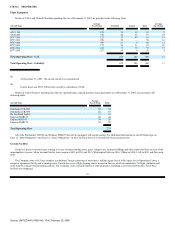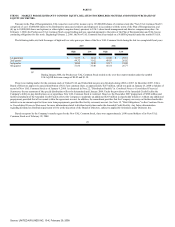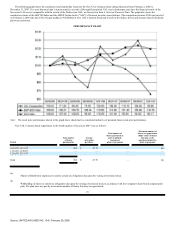United Airlines 2007 Annual Report Download - page 20
Download and view the complete annual report
Please find page 20 of the 2007 United Airlines annual report below. You can navigate through the pages in the report by either clicking on the pages listed below, or by using the keyword search tool below to find specific information within the annual report.
inadequate. If the Company's insurance is not adequate, it may be forced to bear substantial losses from an accident.
The Company relies heavily on automated systems to operate its business and any significant failure of these systems could harm its business.
The Company depends on automated systems to operate its business, including its computerized airline reservation systems, flight operations systems,
telecommunication systems and commercial websites, including united.com. United's website and reservation systems must be able to accommodate a high
volume of traffic and deliver important flight and schedule information, as well as process critical financial transactions. Substantial or repeated website,
reservations systems or telecommunication systems failures could reduce the attractiveness of United's services versus its competitors and materially impair its
ability to market its services and operate its flights.
The Company's business relies extensively on third-party providers. Failure of these parties to perform as expected, or unexpected interruptions in the
Company's relationships with these providers or their provision of services to the Company, could have an adverse effect on its financial condition and
results of operations.
The Company has engaged a growing number of third-party service providers to perform a large number of functions that are integral to its business, such as
operation of United Express flights, operation of customer service call centers, provision of information technology infrastructure and services, provision of
aircraft maintenance and repairs, provision of various utilities and performance of aircraft fueling operations, among other vital functions and services. The
Company does not directly control these third-party providers, although it does enter into agreements with many of them that define expected service
performance. Any of these third-party providers, however, may materially fail to meet their service performance commitments to the Company. The failure of
these providers to adequately perform their service obligations, or other unexpected interruptions of services, may reduce the Company's revenues and increase
its expenses or prevent United from operating its flights and providing other services to its customers. In addition, the Company's business and financial
performance could be materially harmed if its customers believe that its services are unreliable or unsatisfactory.
The Company's high level of fixed obligations could limit its ability to fund general corporate requirements and obtain additional financing, could limit its
flexibility in responding to competitive developments and could increase its vulnerability to adverse economic and industry conditions.
The Company has a significant amount of financial leverage from fixed obligations, including its amended credit facility, aircraft lease and debt financings,
leases of airport property and other facilities, and other material cash obligations. In addition, as of December 31, 2007, the Company had pledged a substantial
majority of its available assets as collateral to secure its various fixed obligations. At December 31, 2007, the Company has 113 unencumbered aircraft with a net
book value of $2.0 billion.
The Company's high level of fixed obligations, a downgrade in the Company's credit ratings or poor credit market conditions could impair its ability to
obtain additional financing, if needed, and reduce its flexibility to conduct its business. Certain of the Company's existing indebtedness also requires it to meet
covenants and financial tests to maintain ongoing access to those borrowings. See Note 12, "Debt Obligations," in the Combined Notes to Consolidated Financial
Statements for further details. A failure to timely pay its debts or other material uncured breach of its contractual obligations could result in a variety of adverse
consequences, including the acceleration of the Company's indebtedness, the withholding of credit card sale proceeds by its credit card service providers and the
exercise of other remedies by its creditors and equipment lessors that could result in material adverse effects on the Company's operations and financial
condition. In such a situation, it is unlikely that the
19
Source: UNITED AIR LINES INC, 10-K, February 29, 2008


